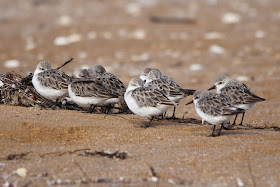These amazing small migratory waders are climbing very quickly up my favourite species list! I had cause to find out more about Red-necked stint Calidris ruficollis after spending some time with a group at Observation Point, Phillip Island last weekend.
 |
| "You know what Reg? I'm beginning to think that he can still see us even when we do hide our heads under our wings!" |
 |
| Red-necked stint Calidris ruficollis "winter plumage" |
It titillates me to think that these little guys endure the extremes of Siberia and Alaska (albeit in the northern summer) only to form sheltering rafts behind driftwood on a balmy Spring morning in Victoria, Australia. OK so it was only about 11'C but the sun was shining and there was only a zephyr of a breeze!
 |
| Red-necked stint. There was a group behind every bit of driftwood. Caspian tern and Pied oystercatcher can be seen in the distance. |
 |
| While I was photographing this group one bird stuck its head up for a better view… |
 |
| A stint on steroids? or Curlew sandpiper Calidris ferruginea |
 |
| Looking at my photos later on I noticed a second sandpiper to the right of the first bird noticed. |
Lots more information about these little travellers at:
Bird on!











Yes Pete, they are truly amazing little travellers, along with all the other waders that visit our shores.
ReplyDeleteLong may they continue!
Pete these are great photos; I love all these birds and isn't it fun when you find something else in amongst them like you did when photo-editing?1 It's been really sad to hear news of lots of short-tailed shearwaters being washed up around Newcastle from migratory exhaustion
ReplyDeleteHI Pete These are great shots of this lovely little bird and wonderful to find the 2 Curlew Sandpipers in the middle of them the Stints.
ReplyDeleteNice job Pete - some great shots!
ReplyDeleteIan
Great series amazing what shows up in photos.
ReplyDeleteYou have make beautiful photos!
ReplyDeleteGreetings, RW & SK
Wow, awesome capture of the shorebirds. And a nice surprise finding the Sandpipers in the flock.
ReplyDeleteGreat photos of the flocks of RN Stints - and interesting to see them in your habitat down there. I have also found Curlew Sandpipers roosting with Stints - and you can't even see them unless they show that bill!
ReplyDeleteGood luck with your kayak shopping! I see a number of guys up here using fishing kayaks - which are bigger and more stable - stability is definitely important if you want to use the kayak to take photos from.
Lovely species, well spotted with the (2) Curlew Sands too.
ReplyDeleteThis is a very interesting series of photos showing the birds huddling behind shelter while the terns and oystercatchers did not. I wonder if they were feeling weak and cold following their long migration? I have only seen one Red-necked Stint in Alaska, but it looked so much different in its breeding colors. It was plenty cold and windy in Alaska but the stint was not trying to find shelter. It was among a huge flock of Western Sandpipers and Dunlins.
ReplyDeleteI and other down-under types enjoy the Northern Hemisphere perspective on these migratory marvels! Thanks John!
DeleteBeautiful shots of these cute little birds.
ReplyDeleteThey are amazing to do that trip at their size I think. It would be great to see them in their breeding colours in Alaska like John.
ReplyDeleteLooking forward to catching up with some of these birds soon!
ReplyDeleteAs far as I recall the wave shot was taken near the Nobbies.
Cheers - Stewart M - Melbourne
I think that some sense of marvel is evoked in all of us when we see shorebirds and contemplate their epic migrations. The sense of wonderment never leaves me when I see hatch-year birds arriving in southern Ontario having made the trip from the arctic tundra where they were born without any help from their parents. And this is just a stop over on their way to South America. Incredible, isn't it?
ReplyDelete